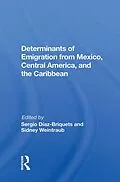The Immigration Reform and Control Act of 1986 (IRCA) was amanifestation of widespread public concern over the volume of undocumentedimmigration into the United States. The principal innovationof this legislation-the provision to impose penalties on employers whoknowingly hire undocumented immigrants-was a response to thisconcern.This effort at restriction was tempered in IRCA by other provisionspermitting the legalization of two types of undocumented immigrantsthosewho had resided in the United States since January 1, 1982; andwhat were called special agricultural workers (SAWs), persons who hadworked in perishable crop agriculture for at least 90 days during specifiedperiods from 1983 to 1986. Approximately 3.1 million persons soughtlegalization (what is popularly referred to as amnesty) under these twoprovisions. The breakdown was roughly 1.8 million under the regularprogram and 1.3 million as SAWs. Mexicans made up 75 percent of thecombined legalization requests.
Autorentext
Diaz-briquets, Sergio
